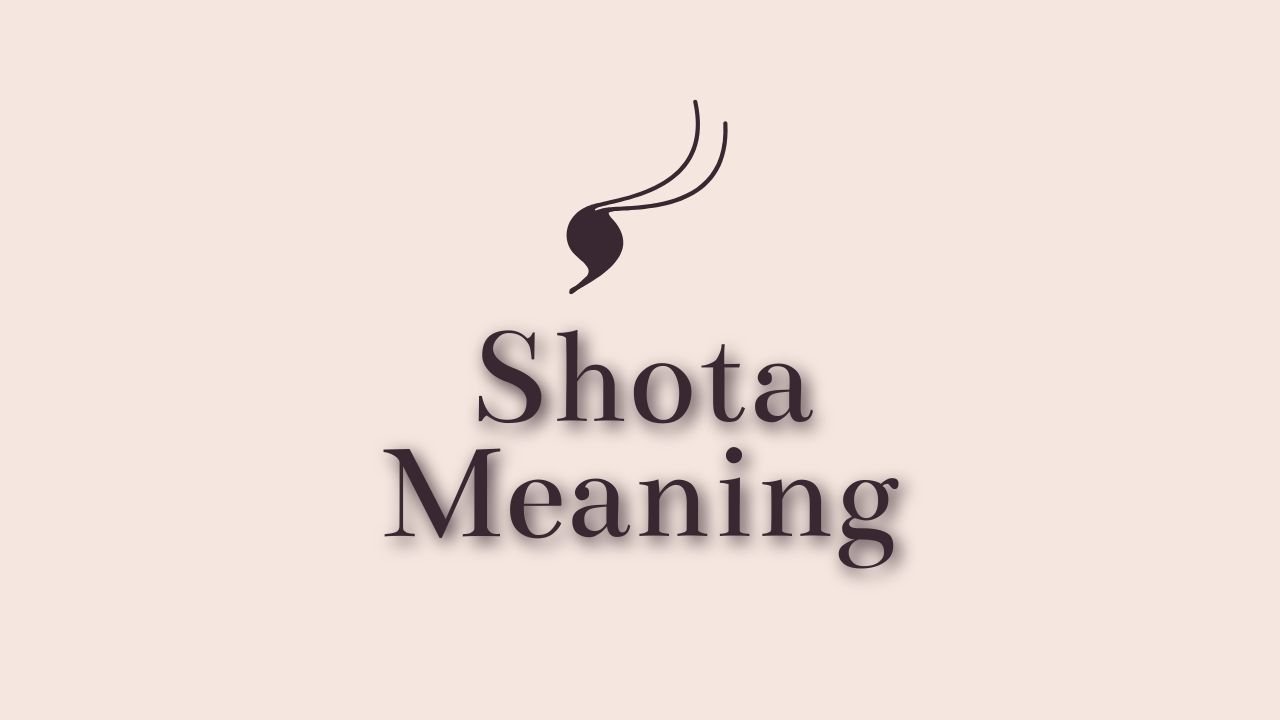The word “shota” is a Japanese term that has gained attention in different cultures around the world. Like many words from Japanese, its meaning depends on the context in which it is used. For some people, it is linked to popular culture, while for others it carries sensitive or controversial associations. Because of this, understanding the real meaning of shota is important before using it.
In this article, we will explore the origin, meaning, usage in Japanese culture, use in anime and manga, global reactions, and facts about this word. By the end, you will have a clear idea of what “shota” means and how people view it.
What Does “Shota” Mean?

The word “shota” is short for “shotacon” (ショタコン) in Japanese. It comes from the name of a popular manga character, Shotaro Kaneda, from the series Tetsujin 28-go created in the 1950s.
- “Shota” refers to young-looking male characters, usually in anime or manga.
- “Con” comes from the English word “complex.”
So, “shota” often means attraction or focus on young-looking boys in fictional works. In Japan, the word can appear in different forms of art, fandom, and online discussions.
Historical Background of the Word
The origin of “shota” connects directly to Japanese manga history.
- 1956: The manga Tetsujin 28-go introduced Shotaro Kaneda, a boy hero who became very popular.
- 1970s–1980s: Japanese fans started using “shotacon” to describe attraction toward characters who looked like Shotaro.
- 2000s: The term spread online through anime and manga fandom communities worldwide.
Today, “shota” is still a niche term but widely recognized in anime culture.
Shota in Japanese Language
In Japanese, words often have different layers of meaning. “Shota” can be used in three main ways:
- Neutral Meaning: Simply a nickname for boys with the name Shota. It is a common male name in Japan.
- Anime/Manga Culture: Refers to young boy characters in a story.
- Sensitive Context: Connected to certain genres of adult anime or manga that are controversial.
This difference in meaning is important. If you hear “shota” in Japan, it may just mean a boy’s name.
Shota in Anime and Manga
Shota is most often seen in anime and manga.
- Many series feature child-like boy characters who are central to the plot.
- Some fans enjoy these characters for their innocence, humor, or bravery.
- However, certain genres present “shota” in an adult way, which has created debate worldwide.
Example Table of Usage in Anime
| Context | Meaning of Shota | Example Use |
|---|---|---|
| Common Japanese Name | A boy named Shota | Shota Aizawa in My Hero Academia |
| Innocent Character Role | Young boy as main or side character | Shotaro Kaneda in Tetsujin 28-go |
| Sensitive Genre | Adult-themed manga/anime usage | Specific niche communities |
Global Reactions to Shota
Outside Japan, “shota” has sparked different reactions:
- Positive Side: Some fans enjoy shota characters as part of anime storytelling.
- Negative Side: Critics argue that adult-themed shota material is problematic.
- Legal Concerns: In some countries, shota content falls under strict laws about fictional depictions of minors.
For this reason, the meaning of shota often depends on culture and law.
Facts and Figures About Shota
Here are some key facts and numbers:
- “Shota” is a real first name in Japan. In 2019, over 3,000 boys were named Shota in Japan.
- The word “shotacon” first appeared in fan magazines in the 1980s.
- Online searches for “shota” peaked between 2005–2015, mostly from anime communities.
- Japan’s manga industry is worth over $5 billion annually, and niche genres like shota exist within that market.
Differences Between Shota and Other Terms
There are other similar words in Japanese culture, and it’s important to know the difference.
| Term | Meaning | Relation to Shota |
|---|---|---|
| Shota | Young-looking boy characters | Main focus of discussion |
| Loli (Lolicon) | Young-looking girl characters | Female counterpart of shota |
| Bishonen | Beautiful young male characters | Usually older teens, not children |
This table shows that “shota” is part of a wider set of Japanese cultural terms.
Controversy Around Shota
The biggest issue with shota is controversy. Many people question whether such portrayals are healthy or harmful.
- Critics: Say that shota normalizes unhealthy attraction to minors.
- Supporters: Argue that shota exists only in fiction and does not harm real people.
- Lawmakers: In places like the UK, Canada, and Australia, fictional works showing shota may be banned.
Because of this, people should be careful about how and where they use the word.
Cultural Impact of Shota
Even with debates, shota has influenced global pop culture:
- Appears in anime conventions and fan art.
- Discussed in academic studies about Japanese media.
- Spread worldwide through internet forums, fanfiction, and meme culture.
Some fans see shota characters as just another type of storytelling, while others view it as a deeper social issue.
Should You Use the Word Shota?
Whether you should use the word “shota” depends on context:
- ✅ Safe in Japan when it’s just a first name.
- ✅ Safe in anime talk if it means a young boy character.
- ⚠️ Risky if used in adult contexts because of legal and ethical concerns.
Always consider your audience. What feels normal in anime fandom may feel inappropriate in a workplace or public setting.
Conclusion:
The meaning of shota is not simple it changes depending on where and how it is used. In Japan, it is a common boy’s name. In anime and manga, it often refers to young-looking boy characters. But in certain adult-themed genres, it has created debate and controversy.
Shota highlights how language can shift in meaning between cultures. For some, it is innocent fun. For others, it raises ethical and legal questions. If you want to use the word, be sure you understand the context and sensitivity around it.


No responses yet